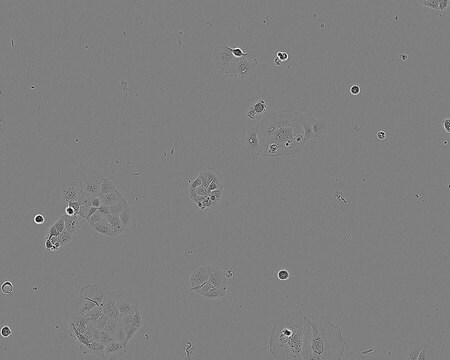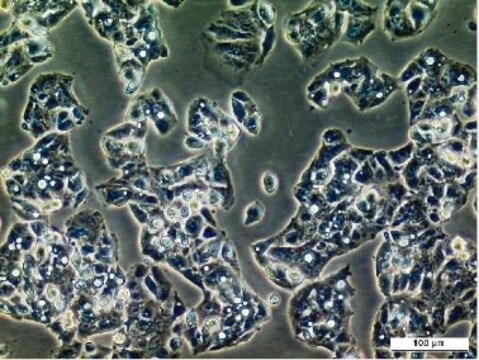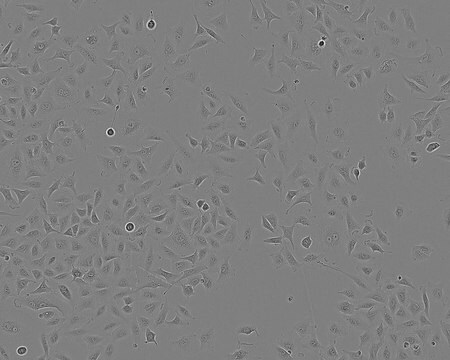RAW 264 Cell Line from mouse
85062803, mouse blood, Macrophage
Faça loginpara ver os preços organizacionais e de contrato
About This Item
Código UNSPSC:
41106514
Produtos recomendados
Nome do produto
RAW 264 Cell Line from mouse, 85062803
fonte biológica
mouse blood
descrição
Mouse leukemic monocyte-macrophage
modo de crescimento
Semi-adherent
cariótipo
Not specified
morfologia
Macrophage
produtos
Lysozyme
receptores
Immunoglobulin and complement
técnica(s)
cell culture | mammalian: suitable
doença(s) relevante(s)
cancer
Condições de expedição
dry ice
temperatura de armazenamento
−196°C
Origem de linhagem celular
Mouse leukaemic monocyte-macrophage
Descrição de linhagem celular
Established from an ascites of a tumour induced in a male mouse by intraperitoneal injection of Abselon Leukaemia virus (A-MuLV). Cells with pinocytose neutral red and phagocytose zymosan. Cells capable of antibody-dependent lysis of sheep erythrocytes and tumour targets. Growth inhibited by LPS (0.5ng/ml).
Aplicação
RAW 264 Cell Line from mouse has been used:
- to study the anti-inflammatory effect of galectin-3 on RAW 264 macrophages which are stimulated with lipopolysaccharide
- to study the effect of titanium particles on progranulin (PGRN) expression in RAW 264 cells
- to study the effects of a nutritional supplement on interferon-γ (IFN-γ)-induced expression of macrophage chemoattractant protein-1 (MCP-1) and intercellular adhesion molecule-1 (ICAM-1)
Meio de cultura
EMEM (EBSS) + 2mM Glutamine + 1% Non Essential Amino Acids (NEAA) + 10% Foetal Bovine Serum (FBS) or DMEM + 2mM Glutamine + 10% Foetal Bovine Serum (FBS).
Rotina de subcultura
Split sub-confluent cultures (70-80%) 1:3 to 1:6 i.e. seeding at 2-4x10,000 cells/cm2; 5% CO2; 37°C. Remove the cells mechanically. Cells are semi-adherent, i.e. some cells grows in suspension, some loosely attach to the surface and others flattened out and attach to the flask. Cells should not be allowed to overgrow and become confluent as this can lead to loss of the flattened adherent cell characteristic.
Outras notas
Additional freight & handling charges may be applicable for Asia-Pacific shipments. Please check with your local Customer Service representative for more information.
Escolha uma das versões mais recentes:
Certificados de análise (COA)
Lot/Batch Number
It looks like we've run into a problem, but you can still download Certificates of Analysis from our Documentos section.
Se precisar de ajuda, entre em contato Atendimento ao cliente
Já possui este produto?
Encontre a documentação dos produtos que você adquiriu recentemente na biblioteca de documentos.
Nossa equipe de cientistas tem experiência em todas as áreas de pesquisa, incluindo Life Sciences, ciência de materiais, síntese química, cromatografia, química analítica e muitas outras.
Entre em contato com a assistência técnica




